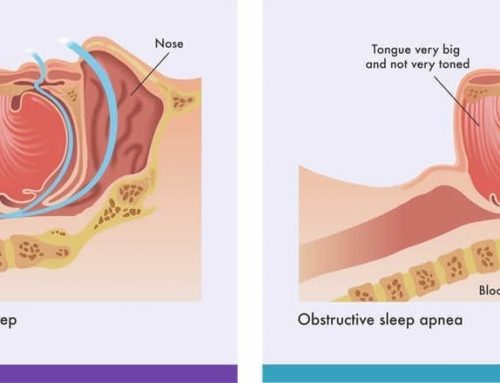
You, Your Partner And Snoring: The Truth
Is snoring stealing your sleep leaving you bogged down and tired during the day? Or are you losing the race to get to sleep first, only to find that you can’t sleep as your partner beats you to sleep and thunders away snoring night after night?
Snoring often results in sleep deprivation for everyone in the bedroom; the snorer and their partner. It can make the thought of getting a night of restful, quality sleep seem impossible. Knowing what snoring is, what causes it, and some of its risk factors can help resolve the snoring and help you and your partner get the sleep you have been missing.
What is it?
Snoring is the hoarse or harsh sound that occurs when air flowing past relaxed tissues in your throat causes them to vibrate as you breathe. Everyone can snore, and many do from time to time – caused by having a cold or allergies – but chronic snoring is associated with different health concerns. Medical experts believe the two most common negative health effects linked to snoring are daytime dysfunction and heart disease. However, if your snoring is paired with excessive daytime sleepiness, difficulty concentrating, morning headaches, restless sleep, or gasping or choking at night, then this could be a sign of a more serious sleeping disorder called obstructive sleep apnea; which half of all loud snorers suffer from.
What causes it?
Many factors can either cause you to snore or are related to snoring. First and foremost, the anatomy of your mouth has a lot to do with if you snore and to the degree which you snore. If you have a low and thicker soft palate this can narrow your airway, squeezing airflow through a smaller airway causes more vibrations and the result is snoring. Also, overweight individuals, especially those with more fatty tissue around the neck, are likely to have more narrow airways. Alcohol consumption or consuming muscle relaxers before sleep causes snoring by relaxing the throat muscles and obstructing air flow. Sleeping position is also a major factor determining whether one snores or not – snoring is most frequent and loudest when one sleeps on their back, giving gravity place to affect the throat and further narrow airways.
Common risk factors for chronic snoring include: being a man, being overweight, having a narrow airway based on the construction of your mouth, and having a family history of snoring or obstructive sleep apnea. Aging also contributes by progressively leading to the relaxation of throat muscles, limiting airflow, and increasing vibrations.
The Next 4 Things To Immediately Do About Snoring
Certain lifestyle changes offer a great solution to your snoring problem. With a few changes you may be off to a fuller more restful sleep, and your sleeping partner will thank you.
- Sleeping on your side as opposed to sleeping on your back can greatly reduce snoring and may get rid of it altogether. Sleeping with a body pillow or taping a tennis ball to your back will encourage you to sleep on your side by offering a more comfortable and snore-less sleeping position.
- Taking a hot shower before bed or applying Vicks® VapoRub to the inside of your nose will help clear your airways before sleep and can help combat nighttime snoring.
- Avoiding the consumption of alcohol before or leading up to bedtime can help counteract snoring.
- Losing weight, although sometimes easier said than done, is a simple and effective way to reduce and eliminate snoring by lessening the amount of fatty tissue around the throat and clearing up your air passages.
How To Deal With Very Bad Snoring: Why Get Treatment?
Getting treatment for snoring is critical for both the sake of the snorer and their partner. Snoring throughout every night leads to poor sleep quality which leads to daytime irritability, tiredness, fatigue, lack of concentration, among other waketime dysfunctions. As long as you are experiencing chronic snoring, you and your partner will continually experience disrupted sleep during the night, and this list of undesirable side effects will apply to both of you. A lack of sleep and disrupted sleep due to reoccurring snoring can also lead to cardiac problems and may be the sign of the more serious and more health damaging sleeping disorder, obstructive sleep apnea (OSA).
OSA is a very serious sleeping disorder that goes far beyond a poor night’s sleep. Without proper diagnosis and treatment, obstructive sleep apnea can have some serious implications. Not only can you experience daytime sleepiness, dysfunction, and irritability, OSA can also increase the risk of stroke, obesity, depression, diabetes, and high blood pressure. Hypertension is the most common condition that can be caused by obstructive sleep apnea and heart disease can result as well.
Don’t risk your health or that of your partner with another night of bad sleep! If you have some of the signs and symptoms of obstructive sleep apnea or think your snoring may be part of a more serious disruptive sleep disorder, we encourage you to take our online sleep assessment for insights, and visit your personal physician to order a home sleep test through Vitalistics for proper diagnosis of your sleep problems from the comfort of your own home.


















